Pixelscan Review 2026: Features, Uses & Best Alternatives
Take a Quick Look
Learn the detailed review of Pixelscan, testing your IP address, browser OS, hardware, software, and so on. Double check whether your identity is safe with Pixelscan alternatives and fix the fingerprint leaks with antidetect browser.
Every time you browse the web, dozens of invisible trackers collect data about your device—your IP address, system settings, even how your graphics card renders images. Tools like Pixelscan reveal just how much of your digital fingerprint is exposed.
In this review, let's explore what is Pixelscan, how it works, its key features, and when you might need a Pixelscan alternative. You'll also learn how to interpret results and strengthen your online privacy with practical solutions. Read on with a critical eye—by the end, you'll not only know what Pixelscan shows you, but also what to do about it.
What is Pixelscan.net?
Pixelscan is a reliable multi-checker for testing how detectable your setup really is. Every time you visit a site, your device reveals details—like screen size, fonts, IP address, and browser version—that combine into a unique "fingerprint." Pixelscan brings this together with additional checks for DNS leaks, proxies, geolocation, and bot detection, giving you a complete view in one place. With clear, instant results, you can stay invisible, protected, and in control.
Pixelscan analyzes this information and shows what others can see. Marketers, websites, and even fraud detection systems use similar methods to track visitors. By testing your setup on Pixelscan, you'll know exactly how much information you're leaking.
In short, Pixelscan is a diagnostic tool that shows what information is visible online. It provides a clear view of your exposure, allowing you to understand your setup and take any necessary precautions.
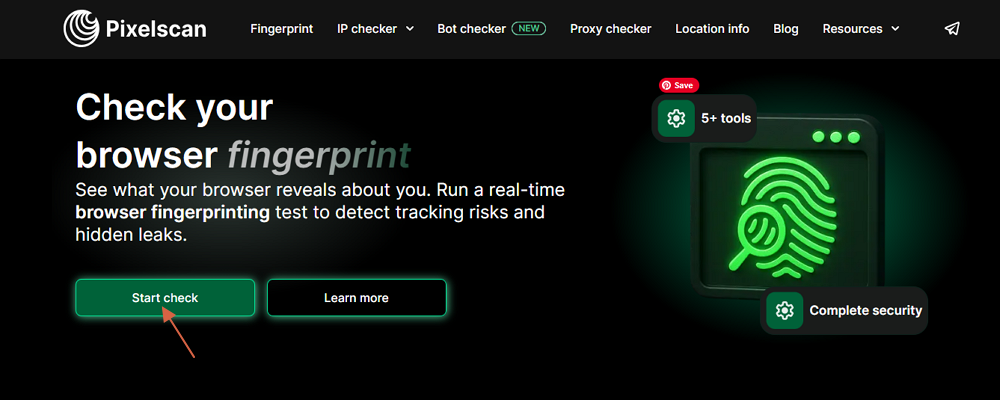
How Does Pixelscan Work?
Pixelscan analyzes dozens of subtle browser fingerprint signals that websites use to identify visitors. When you load the page, it examines data points such as canvas rendering, audio context, installed fonts, WebGL properties, and HTTP headers. Each of these signals may seem harmless on their own, but when combined, they create a unique fingerprint that distinguishes your device from millions of others.
Pixelscan then compares this fingerprint against known patterns to reveal how traceable you are. If your setup is too unique, you become easier to track across sites, even without cookies. The test also highlights potential leaks—like mismatched settings or exposed identifiers—that could compromise your anonymity.
Pixelscan doesn't just display raw data; it shows you how your configuration might look to websites, advertisers, or fraud detection systems.
Why Use Pixelscan? Key Features
Pixelscan isn't just a curiosity tool—it's a practical way to understand how exposed you are online. Here are its core functions:
- Fingerprint Check – Analyzes dozens of signals (canvas, fonts, WebGL, audio) to determine how unique your browser environment appears.
- IP Check – Detects your visible IP address and matches it with your location and ISP.
- Proxy Check – Tests whether your proxy or VPN is transparent, potentially exposing your real IP.
- Bot Check – Identifies whether your activity looks automated, which is critical for avoiding account bans.
- DNS Leak Test – Ensures your DNS requests aren't routed through your ISP, which could reveal browsing activity.
- IP Blacklist Test – Checks if your current IP is flagged on public blacklists, a common issue with shared or low-quality proxies.
- VPN Check – Verifies whether your VPN is functioning correctly and fully masking your real IP and location, ensuring your connection remains private and secure.
- Location Info – Shows the location your device appears to be in, including country, city, and region, helping you verify that your IP, proxy, or VPN is presenting the correct location.
By combining these tests, Pixelscan gives users—from privacy-conscious individuals to affiliate marketers—a clear snapshot of their digital footprint and where improvements are needed.
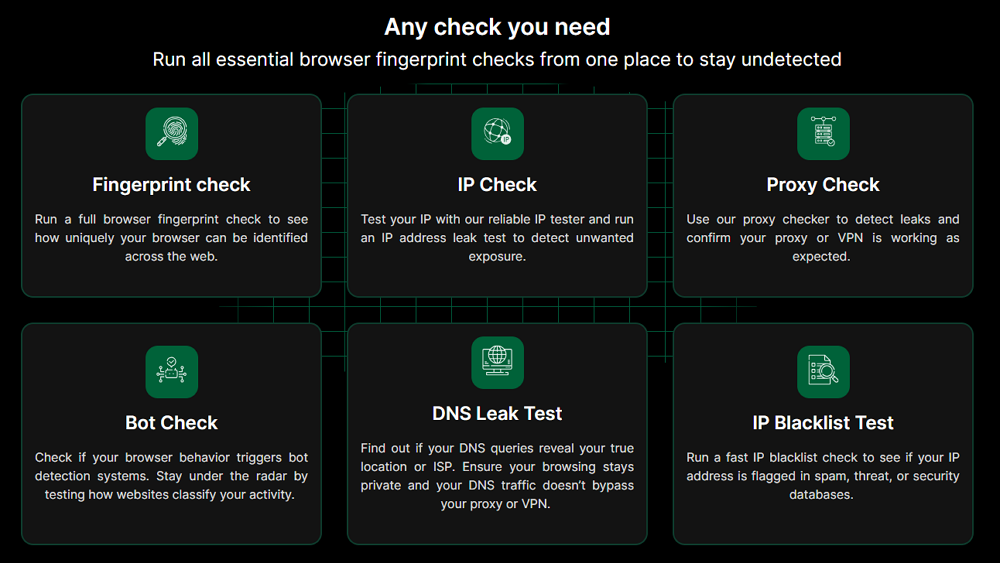
Pixelscan IP Check: What It Reveals About You
One of Pixelscan's most valuable features is its IP check. Your IP address is like your digital home address—it reveals:
- Your country and city
- Your ISP (Internet Service Provider)
- Your proxy or VPN use (if detectable)
Why it matters:
--A real IP leak can expose your identity even when using a VPN.
--Websites may flag suspicious activity if your IP doesn't match your browser fingerprint.
--Multi-account users can get banned if their IPs overlap.
👉 Actionable Tip: If you're managing sensitive projects, always combine Pixelscan IP testing with residential proxies or antidetect browsers for stronger anonymity.
How to Use Pixelscan Safely & Effectively
Here's a quick guide:
1. Go to pixelscan.net.
2. Run a test. Click "Start check" to get started. Wait for the scan to collect your data.

3. Review the results. Look at IP, fingerprint uniqueness, and system info.
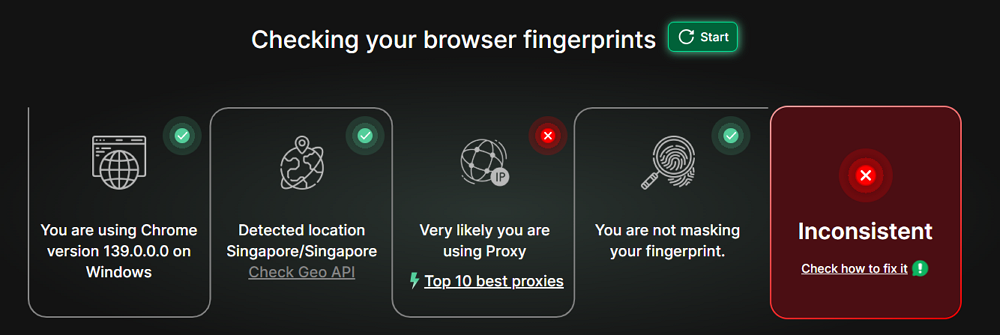
4. Spot weaknesses. Did your proxy leak? Is your fingerprint too unique? Scroll down to see what websites see about you from the dimensions of IP address details and Extended version.
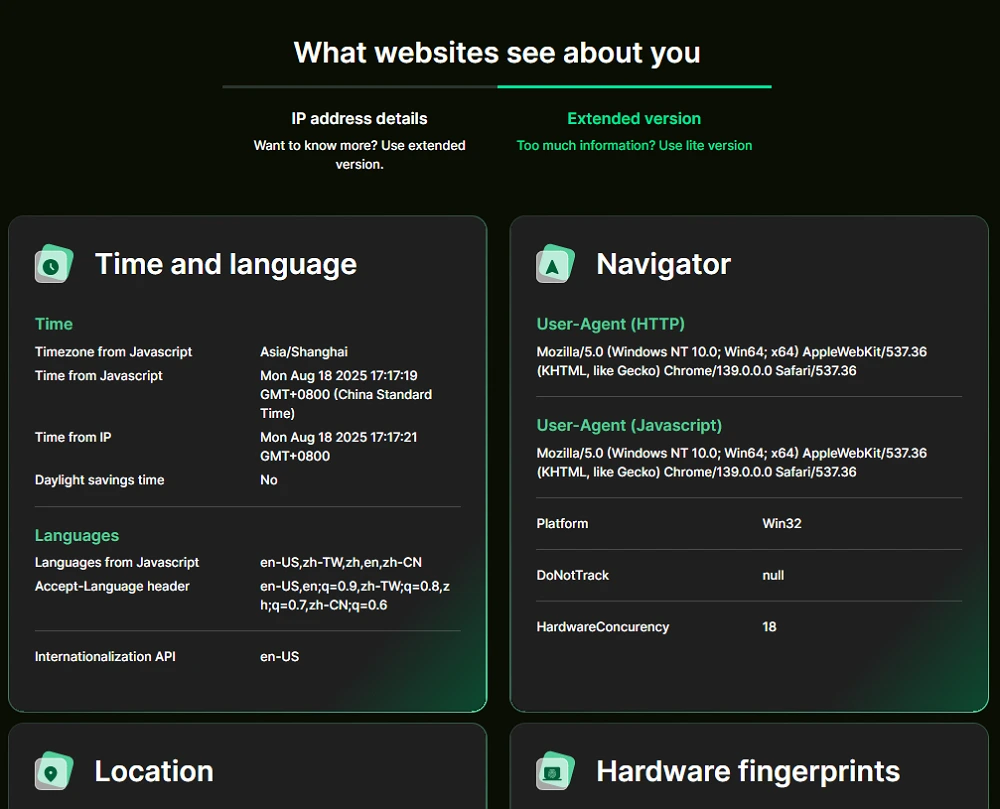
5. Adjust. Use privacy tools or an antidetect browser to reduce exposure.
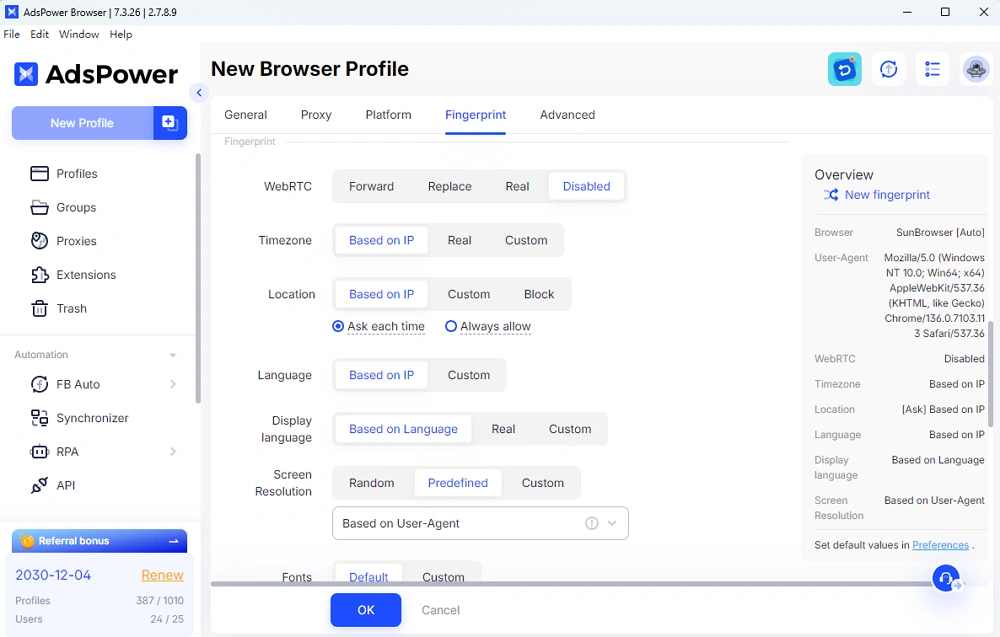
6. Re-test via Pixelscan tool when opening AdsPower profile that you adjusted before.
Pro Tip: Don't rely only on Pixelscan. Use it as part of a wider privacy strategy.
Pixelscan + Antidetect Browsers: Boosting Privacy & Anonymity
Pixelscan tells you how exposed you are, but it doesn't protect you. That's where anti-detect browsers come in.
As one of the most secure and efficient browsers, AdsPower allows you to:
- Create separate browser profiles, each with unique fingerprints.
- Integrate proxies to mask IP addresses.
- Manage multiple accounts without cross-tracking.
- Pass fingerprint tests, including Pixelscan, with safer setups.
Think of it this way:
- Pixelscan = diagnosis tool.
- AdsPower (or similar) = treatment.
Use Pixelscan to test, then AdsPower to protect. Together, they form a reliable privacy stack.
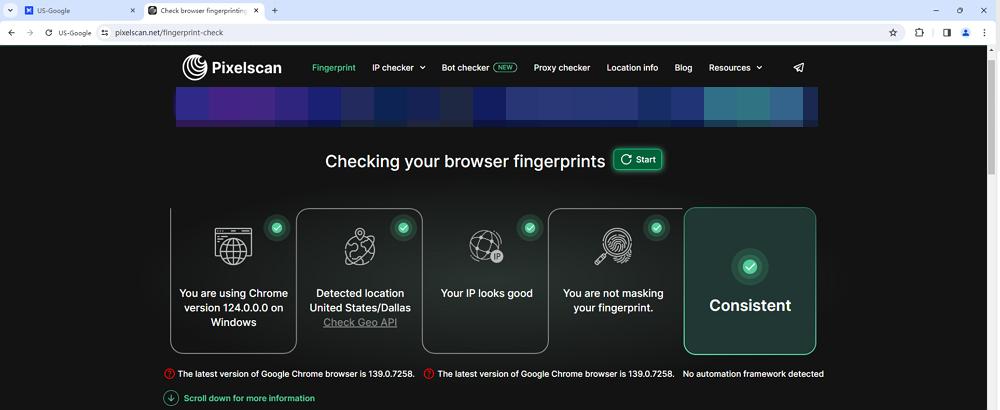
Best Pixelscan Alternatives
Why You Need Alternatives to Pixelscan
Pixelscan provides reliable checks, but for achieving a truly undetectable setup, it’s wise to use additional tools to double-check results, explore different methods, or confirm your configuration.
Top Alternatives to Pixelscan
Provides detailed reports on fingerprinting vectors.
Tracks how unique your fingerprint is compared to others.
An alternative with updated fingerprint detection.
Lightweight browser fingerprint checker.
Scores your anonymity level and detects VPN/proxy usage.
Tip: Try multiple tools. If all show the same vulnerabilities, it's time to upgrade your privacy setup. At this time, AdsPower browser will help you a lot in adjusting browser fingerprints and improve your privacy.
FAQ
Pixelscan Extension: Is It Worth Using?
Pixelscan offers an official Firefox extension. Using the official extension ensures you get reliable results and stay safe—avoid third-party downloads that claim to be Pixelscan, as they may be unsafe.
Is Pixelscan Safe?
Yes, it's safe to use. Pixelscan only reads data your browser already shares. It doesn't install anything or track you beyond the test.
Can Pixelscan Hide My IP Address?
No. Pixelscan.net only shows what's visible—it doesn't mask or hide your IP. To protect your IP, you'll need a VPN, proxy, or antidetect browser.

People Also Read
- Top Tools to Prevent Account Bans by Ensuring Consistent Browser Environments (2026 Guide)
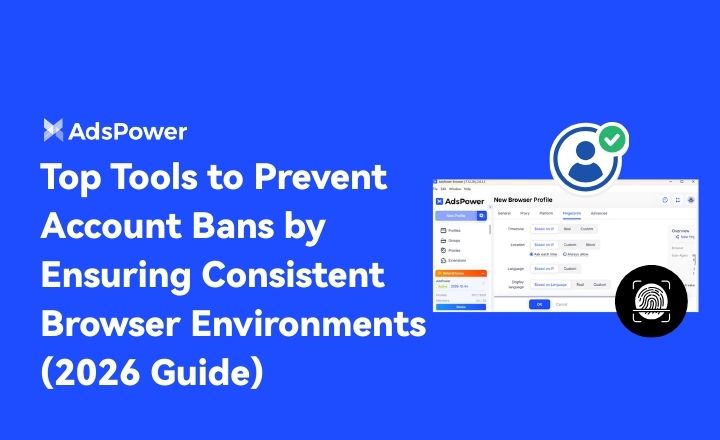
Top Tools to Prevent Account Bans by Ensuring Consistent Browser Environments (2026 Guide)
If you are looking for the best tool for preventing account bans with consistent browser environments, don't miss such a practical guide
- Browser Consistency & Kernel Mismatch: Why Accounts Get Banned (2026)
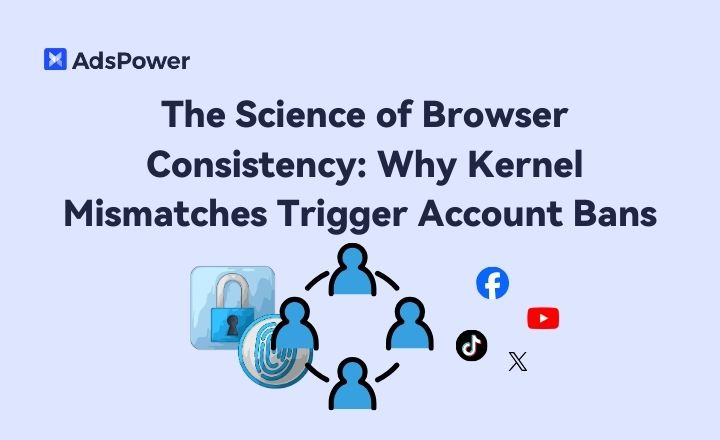
Browser Consistency & Kernel Mismatch: Why Accounts Get Banned (2026)
Avoid bans caused by fingerprint mismatches. Learn how AdsPower syncs browser cores, TLS, Canvas, and WebGL signals for consistent profiles in 2026.
- How Browser Fingerprinting Triggers Account Locks (And How AdsPower Prevents Them)
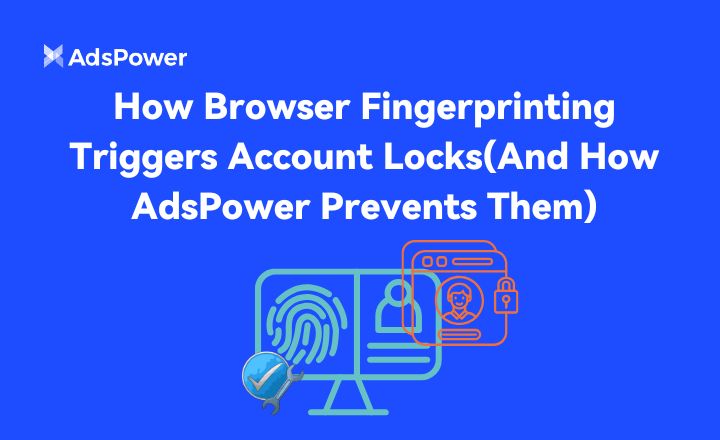
How Browser Fingerprinting Triggers Account Locks (And How AdsPower Prevents Them)
How browser fingerprint mismatches cause account locks & how AdsPower's dual-engine architecture with real browser cores & Native Mobile Simulation pr
- 8 Best Whoer Alternatives in 2026 ( Accurate & Private IP Check Tools)

8 Best Whoer Alternatives in 2026 ( Accurate & Private IP Check Tools)
Looking for a Whoer.net alternative? Discover our 2026 list of the 8 best IP check tools for accurate, private fingerprint analysis and enhanced onlin
- What Is WebRTC Used For? Does WebRTC Leak Your IP Address?
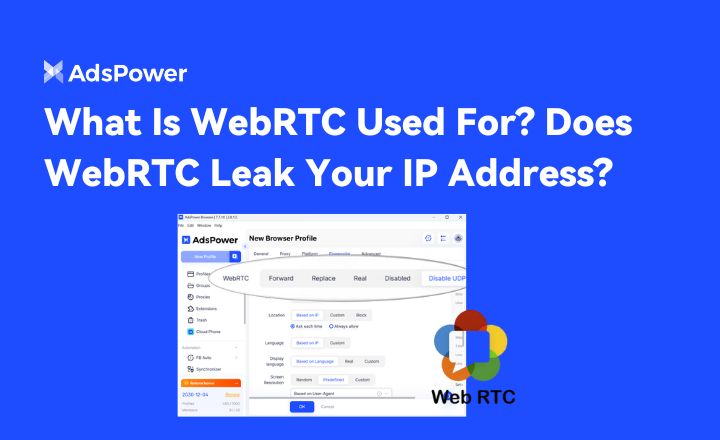
What Is WebRTC Used For? Does WebRTC Leak Your IP Address?
Learn what WebRTC is, what it's used for, whether it leaks your IP address, and how to stay protected with tools like AdsPower's WebRTC modes.


